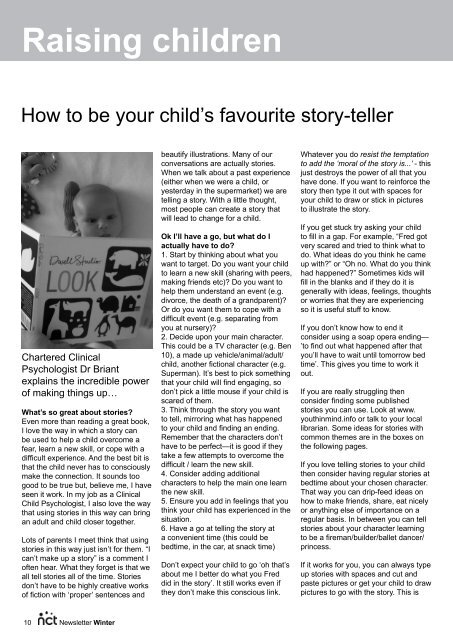Autumn 2011 - Mandy Mazliah
Autumn 2011 - Mandy Mazliah
Autumn 2011 - Mandy Mazliah
You also want an ePaper? Increase the reach of your titles
YUMPU automatically turns print PDFs into web optimized ePapers that Google loves.
Raising children<br />
How to be your child’s favourite story-teller<br />
Chartered Clinical<br />
Psychologist Dr Briant<br />
explains the incredible power<br />
of making things up…<br />
What’s so great about stories?<br />
Even more than reading a great book,<br />
I love the way in which a story can<br />
be used to help a child overcome a<br />
fear, learn a new skill, or cope with a<br />
difficult experience. And the best bit is<br />
that the child never has to consciously<br />
make the connection. It sounds too<br />
good to be true but, believe me, I have<br />
seen it work. In my job as a Clinical<br />
Child Psychologist, I also love the way<br />
that using stories in this way can bring<br />
an adult and child closer together.<br />
Lots of parents I meet think that using<br />
stories in this way just isn’t for them. “I<br />
can’t make up a story” is a comment I<br />
often hear. What they forget is that we<br />
all tell stories all of the time. Stories<br />
don’t have to be highly creative works<br />
of fiction with ‘proper’ sentences and<br />
beautify illustrations. Many of our<br />
conversations are actually stories.<br />
When we talk about a past experience<br />
(either when we were a child, or<br />
yesterday in the supermarket) we are<br />
telling a story. With a little thought,<br />
most people can create a story that<br />
will lead to change for a child.<br />
Ok I’ll have a go, but what do I<br />
actually have to do?<br />
1. Start by thinking about what you<br />
want to target. Do you want your child<br />
to learn a new skill (sharing with peers,<br />
making friends etc)? Do you want to<br />
help them understand an event (e.g.<br />
divorce, the death of a grandparent)?<br />
Or do you want them to cope with a<br />
difficult event (e.g. separating from<br />
you at nursery)?<br />
2. Decide upon your main character.<br />
This could be a TV character (e.g. Ben<br />
10), a made up vehicle/animal/adult/<br />
child, another fictional character (e.g.<br />
Superman). It’s best to pick something<br />
that your child will find engaging, so<br />
don’t pick a little mouse if your child is<br />
scared of them.<br />
3. Think through the story you want<br />
to tell, mirroring what has happened<br />
to your child and finding an ending.<br />
Remember that the characters don’t<br />
have to be perfect—it is good if they<br />
take a few attempts to overcome the<br />
difficult / learn the new skill.<br />
4. Consider adding additional<br />
characters to help the main one learn<br />
the new skill.<br />
5. Ensure you add in feelings that you<br />
think your child has experienced in the<br />
situation.<br />
6. Have a go at telling the story at<br />
a convenient time (this could be<br />
bedtime, in the car, at snack time)<br />
Don’t expect your child to go ‘oh that’s<br />
about me I better do what you Fred<br />
did in the story’. It still works even if<br />
they don’t make this conscious link.<br />
Whatever you do resist the temptation<br />
to add the ‘moral of the story is...’ - this<br />
just destroys the power of all that you<br />
have done. If you want to reinforce the<br />
story then type it out with spaces for<br />
your child to draw or stick in pictures<br />
to illustrate the story.<br />
If you get stuck try asking your child<br />
to fill in a gap. For example, “Fred got<br />
very scared and tried to think what to<br />
do. What ideas do you think he came<br />
up with?” or “Oh no. What do you think<br />
had happened?” Sometimes kids will<br />
fill in the blanks and if they do it is<br />
generally with ideas, feelings, thoughts<br />
or worries that they are experiencing<br />
so it is useful stuff to know.<br />
If you don’t know how to end it<br />
consider using a soap opera ending—<br />
’to find out what happened after that<br />
you’ll have to wait until tomorrow bed<br />
time’. This gives you time to work it<br />
out.<br />
If you are really struggling then<br />
consider finding some published<br />
stories you can use. Look at www.<br />
youthinmind.info or talk to your local<br />
librarian. Some ideas for stories with<br />
common themes are in the boxes on<br />
the following pages.<br />
If you love telling stories to your child<br />
then consider having regular stories at<br />
bedtime about your chosen character.<br />
That way you can drip-feed ideas on<br />
how to make friends, share, eat nicely<br />
or anything else of importance on a<br />
regular basis. In between you can tell<br />
stories about your character learning<br />
to be a fireman/builder/ballet dancer/<br />
princess.<br />
If it works for you, you can always type<br />
up stories with spaces and cut and<br />
paste pictures or get your child to draw<br />
pictures to go with the story. This is<br />
10 Newsletter Winter





